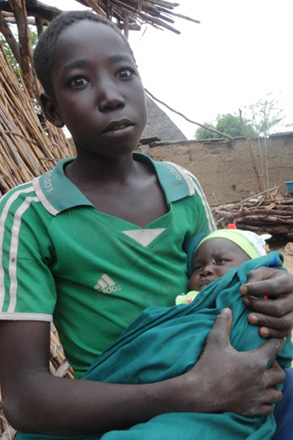Life is good for Ali Matilkoet, but it hasn’t always been so for his family of eight. From his grass hut in his small village of Douvangar, Cameroon, he can now reflect on the difficulties of the life he and his family led not long ago.
Prior to joining the Heifer project life was difficult. He and his wife, Djamila, had two children in primary school and paying the school fees each month was nearly impossible. Djamila had to beg and borrow to make the payments of $7.91. The children often missed days and weeks of school, and their grades suffered.
“We had been beaten down and beaten out. Our family life was wearing out, the present was slipping through my palms and the future was bleak.”
Day after day, life on the farm was a struggle. The use of rudimentary tools, limited farming methods, inappropriate seeds and weak animals challenged the family’s farm output.
“We would plow the hard soils from sunrise to sunset and could barely get 440 pounds of millet from our nearly 2 acres of farmland. With just one crop and a poor harvest, we could barely eat. Between August and September, we would borrow or beg for food from our parents and neighbors, and there were days that we would go without a meal,” Djamila said.
There seemed to be no hope. They had two goats, but they didn’t know how to use them, so both Ali and Djamila would work on other farms for money. Further, poor hygiene practices and low income caused their health to decline.
Basic chores and daily life were an enormous challenge. Cooking food for the family was Djamila’s most tedious task, “I had a three-stone fireplace, on which I prepared food. The smoke was too much for me to bear and it took me about four hours to prepare a family meal. The clay pots I use in cooking were always breaking on the three stones. The wood I used for fuel often took months to gather. In the heart of the rainy season, I was forced to start using part of our dry roof to fuel the fire in order to cook.” Djamila explained.
Give now to make sure that families like Djamila and Ali achieve their dreams.

Heifer Brings Hope
Their journey with Heifer began uneventfully in 2010 when they heard about Heifer Cameroon’s work with a nearby group. It seemed promising. They quickly put their self-help group in order and applied for assistance. It was like a dream come true when 18 members of the group were selected for Heifer’s support in 2011.
“I danced the day I knew we were going to benefit from Heifer, I could barely sleep due to excitement,” Djamila said. “I began feeling better. The best day in my life was when we received four sheep from Heifer. I would go out and check them in the night to be sure that I was not dreaming. When I was still savoring the bliss of sheep, I was given a donkey, plow, seeds and proper training to manage the items and care for my family.” She can’t stop smiling as she shares her excitement during that time.
Djamila’s Gift
One of the most significant gifts of the project for Djamila is the improved cook stove she received in 2012. “With the new stove, I reduced my kitchen time to just two hours a day and also reduced the time spent on cleaning pots. I fetch wood for two weeks and use it for the entire year.” she said. Burning less wood, the more efficient stoves save the family a tremendous amount of money.
Djamila is happy to share this knowledge with others. She has trained six other women in her community, and they all have improved stoves now.
Recipe for Transformation
All it took to completely transform Ali and Djamila’s life was Heifer’s support and their willingness to do better. In less than two years they went from owning two unproductive goats to operating a full-fledged productive farm. Once novices, they feel they have become experts. “I would not have been able to attain this level of production without all the capacity building I gained from Heifer trainings,” Djamila shared.
The family now enjoys full participation and sharing and caring. They work together to run the family business. They share the workload, as well as the fruits of their labor. Neighbors who once shunned them look to them for advice on running their own farms. “I am more focused on my family, taking care of the livestock and working with my wife on our farm,” Ali said. “We are good friends now.”
Since joining the Heifer project, Ali and Djamila earn about $500 a year–more than double what they used to subsist on. All of their children are in school, the fees are paid on time, and their grades are good. They’ve gained respect in their community and have become role models for other families. With improved health, their medical costs have decreased. But on the rare occasion that someone gets sick, they can get good health care without worry about the cost.
What’s next for Ali and Djamila? They hope to build a new and stronger house, run electricity to their home, and send all of their children to college.
Make a year-end gift today.
Story and Photos courtesy of Heifer Cameroon
